| Listing 1 - 10 of 40 | << page >> |
Sort by
|
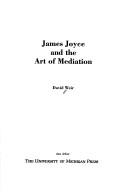
ISBN: 0472106538 Year: 1996 Publisher: Ann Arbor, Mich. University of Michigan Press
Abstract | Keywords | Export | Availability | Bookmark
 Loading...
Loading...Choose an application
- Reference Manager
- EndNote
- RefWorks (Direct export to RefWorks)
Joyce, James --- Bemiddeling --- Conciliation --- Mediation --- Médiation --- Narration (Rhetoric) --- Narration (Rhétorique) --- Narrative writing --- Verhaal (Retoriek) --- Aesthetics --- Technique
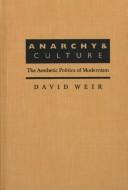
ISBN: 1558490841 9781558490840 0585084254 9780585084251 1558490833 9781558490833 Year: 1997 Publisher: Amherst, Mass. University of Massachusetts Press
Abstract | Keywords | Export | Availability | Bookmark
 Loading...
Loading...Choose an application
- Reference Manager
- EndNote
- RefWorks (Direct export to RefWorks)
Anarchism is generally understood as a failed ideology, a political philosophy that once may have had many followers but today attracts only cranks and eccentrics. This book argues that the decline of political anarchism is only half the story; the other half is a tale of widespread cultural success. David Weir develops this thesis in several ways. He begins by considering the place of culture in the political thought of the classical anarchist thinkers William Godwin, Pierre-Joseph Proudhon, Mikhail Bakunin, and Peter Kropotkin. He then shows how the perceived "anarchy" of nineteenth-century society induced writers such as Matthew Arnold, Henry James, and Fyodor Dostoyevsky to turn away from politics and seek unity in the idea of a common culture. Yet as other late nineteenth-century writers and artists began to sympathize with anarchism, the prospect of a common culture became increasingly remote. In Weir's view, the affinity for anarchism that developed among members of the artistic avant-garde lies behind much of fin de siecle culture. Indeed, the emergence of modernism itself can be understood as the aesthetic realization of anarchist politics. In support of this contention, Weir shows that anarchism is the key aesthetic principle informing the work of a broad range of modernist figures, from Henrik Ibsen and James Joyce to dadaist Hugo Ball and surrealist Luis Bunuel. Weir concludes by reevaluating the phenomenon of postmodernism as only the most recent case of the migration of politics into aesthetics, and by suggesting that anarchism is still very much with us as a cultural condition.
Sociology of literature --- Political philosophy. Social philosophy --- anno 1800-1899 --- Anarchism. --- Literature and society. --- Literature, Modern --- Modernism (Literature) --- Politics and literature. --- History and criticism. --- Modernism (Literature). --- Politics and literature --- Anarchism --- Literature and society --- Crepuscolarismo --- Literary movements --- Literature --- Literature and sociology --- Society and literature --- Sociology and literature --- Sociolinguistics --- Anarchism and anarchists --- Anarchy --- Government, Resistance to --- Libertarianism --- Nihilism --- Socialism --- Literature and politics --- History and criticism --- Social aspects --- Political aspects
Book
ISBN: 0006331955 Year: 1973 Publisher: New York Fontana/Collins
Abstract | Keywords | Export | Availability | Bookmark
 Loading...
Loading...Choose an application
- Reference Manager
- EndNote
- RefWorks (Direct export to RefWorks)
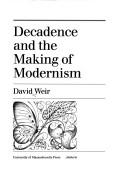
ISBN: 0870239929 0870239910 Year: 1996 Publisher: Amherst, Mass. University of Massachusetts Press
Abstract | Keywords | Export | Availability | Bookmark
 Loading...
Loading...Choose an application
- Reference Manager
- EndNote
- RefWorks (Direct export to RefWorks)
Decadence (Literary movement) --- Decadenten (Literaire beweging) --- Decadentie (Literaire beweging) --- Decadentisme --- Décadence (Mouvement littéraire) --- Décadentisme --- Décadents (Mouvement littéraire) --- Modernism (Literature) --- Modernisme (Literatuur) --- Modernisme (Littérature) --- Crepuscolari --- Crepuscolarismo --- Crépusculaires (Poètes) --- Crépuscularisme --- Penumbrismo --- Poètes crépusculaires --- Poésie crépusculaire --- Poésie pénombriste --- Pénombrisme --- Comparative literature --- anno 1800-1899 --- Decadence (Literary movement). --- Modernism (Literature).
Book
ISBN: 9781558498792 9781558498785 Year: 2011 Publisher: Amherst University of Massachusetts press
Abstract | Keywords | Export | Availability | Bookmark
 Loading...
Loading...Choose an application
- Reference Manager
- EndNote
- RefWorks (Direct export to RefWorks)
S02/0300 --- S09/0600 --- China: General works--Chinese culture and the West and vice-versa --- China: Foreign relations and world politics--China and USA: general and before 1949 --- American literature --- East and West --- Orientalism --- Public opinion --- Civilization, Western --- Civilization, Oriental --- Occident and Orient --- Orient and Occident --- West and East --- Eastern question --- History and criticism --- History --- Asian influences --- Oriental influences --- Western influences --- East Asia --- United States --- Asia, East --- Asia, Eastern --- East (Far East) --- Eastern Asia --- Far East --- Orient --- Foreign public opinion, American. --- In literature. --- Relations --- Civilization --- East Asian influences. --- Intellectual life. --- Foreign public opinion [American ] --- Intellectual life --- In literature --- Pound, Ezra Loomis --- Criticism and interpretation --- Lowell, Amy Lawrence --- Eliot, Thomas Stearns --- Emerson, Ralph Waldo
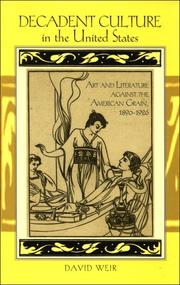
ISBN: 9780791472774 0791472779 Year: 2008 Publisher: Albany State university of New York press
Abstract | Keywords | Export | Availability | Bookmark
 Loading...
Loading...Choose an application
- Reference Manager
- EndNote
- RefWorks (Direct export to RefWorks)
American literature --- Art, American --- Decadence (Literary movement) --- Decadence in art --- Degeneration --- History and criticism. --- History. --- Social aspects --- United States --- Boston (Mass.) --- Chicago (Ill.) --- San Francisco (Calif.) --- Intellectual life --- Intellectual life. --- Decadence --- Eugenics --- Heredity, Human --- Sociology --- Vice --- Literary movements --- Literature, Modern --- American art --- Eight (Group of American artists) --- Indian Space (Group of artists) --- Mission School (Group of artists) --- NO!Art (Group of artists) --- Old Bohemians (Group of artists) --- Stieglitz Circle (Group of artists) --- History and criticism --- History --- Social aspects&delete& --- San Francisco County (Calif.) --- San Francisco --- San Francisco City & County (Calif.) --- San Francisco City and County (Calif.) --- City & County of San Francisco (Calif.) --- City and County of San Francisco (Calif.) --- Saint Francisco (Calif.) --- Yerba Buena (Calif.) --- Chikago (Ill.) --- Chikaho (Ill.) --- City of Chicago (Ill.) --- Shiḳago (Ill.) --- Čikago (Ill.) --- City of Boston (Mass.) --- Beantown (Mass.) --- بوسطن (Mass.) --- Būsṭun (Mass.) --- Бостон (Mass.) --- Горад Бостан (Mass.) --- Horad Bostan (Mass.) --- Бостан (Mass.) --- Bostan (Mass.) --- Бостън (Mass.) --- Bostŭn (Mass.) --- Βοστώνη (Mass.) --- Vostōnē (Mass.) --- Bostono (Mass.) --- بوستون (Mass.) --- Pô-sṳ-tun (Mass.) --- 보스턴 (Mass.) --- Bosŭt'ŏn (Mass.) --- Posŭt'ŏn (Mass.) --- Pokekona (Mass.) --- בוסטון (Mass.) --- Bostonia (Mass.) --- Bostona (Mass.) --- Bostonas (Mass.) --- ボストン (Mass.) --- באסטאן (Mass.) --- Bostons (Mass.) --- 波士顿 (Mass.) --- Boshidun (Mass.) --- شيكاغو (Ill.) --- Shīkāghū (Ill.) --- Çikaqo (Ill.) --- Чыкага (Ill.) --- Chykaha (Ill.) --- Чикаго (Ill.) --- Shikááʼgóó (Ill.) --- Σικάγο (Ill.) --- Sikago (Ill.) --- Kikako (Ill.) --- שיקגו (Ill.) --- Sicagum (Ill.) --- Chicagia (Ill.) --- Chiagum (Ill.) --- Čikāga (Ill.) --- シカゴ (Ill.) --- شکاگو (Ill.) --- Shikāgū (Ill.) --- Kyekago (Ill.) --- Tchicago (Ill.) --- שיקאגא (Ill.) --- Čėkaga (Ill.) --- 芝加哥 (Ill.) --- Zhijiage (Ill.)
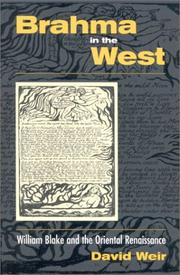
ISBN: 0791486400 1417506911 9781417506910 0791458172 9780791458174 0791458180 9780791458181 9780791486405 0791458172 9780791458174 Year: 2003 Publisher: Albany, NY State University of New York Press
Abstract | Keywords | Export | Availability | Bookmark
 Loading...
Loading...Choose an application
- Reference Manager
- EndNote
- RefWorks (Direct export to RefWorks)
Examining William Blake's poetry in relation to the mythographic tradition of the eighteenth century and emphasizing the British discovery of Hindu literature, David Weir argues that Blake's mythic system springs from the same rich historical context that produced the Oriental Renaissance. That context includes republican politics and dissenting theology—two interrelated developments that help elucidate many of the obscurities of Blake's poetry and explain much of its intellectual energy. Weir shows how Blake's poetic career underwent a profound development as a result of his exposure to Hindu mythology. By combining mythographic insight with republican politics and Protestant dissent, Blake devised a poetic system that opposed the powers of Church and King.
Hindu mythology. --- Hinduism in literature. --- Orientalism in literature. --- English poetry --- Brahman mythology --- Mythology, Hindu --- Vedic mythology --- Mythology --- English literature --- Indic influences. --- Brahmā --- Blake, William, --- Blake, W. --- Blake, William --- Blake, William, 1757-1827 --- Bleĭk, Uilʹi︠a︡m, --- בליק, ויליאם, --- בלייק, ויליאם, --- Брахма --- Brakhma --- Брама --- Brama --- Βράχμα --- Vrachma --- Brahmao --- ברהמה --- Brahmah --- ブラフマー --- Burafuma --- Braxma --- Phạm Thiên --- 梵天 --- Fan Tian --- Fantian --- In literature. --- Religion. --- Knowledge --- India. --- Mythology. --- Brahmā (Hindu deity) in literature. --- Brahma --- Brahma (Hindu deity) in literature.

ISBN: 0585084262 9780585084268 0870239910 0870239929 9780870239915 9780870239922 Year: 1995 Publisher: Amherst University of Massachusetts Press
Abstract | Keywords | Export | Availability | Bookmark
 Loading...
Loading...Choose an application
- Reference Manager
- EndNote
- RefWorks (Direct export to RefWorks)
The cultural phenomenon known as "decadence" has often been viewed as an ephemeral artistic vogue that fluorished briefly in late nineteenth- and early twentieth-century Europe. This study makes the case for decadence as a literary movement in its own right, based on a set of aesthetic principles that formed a transitional link between romanticism and modernism. Understood in this developmental context, decadence represents the aesthetic substratum of a wide range of fin-de-siecle literary schools, including naturalism, realism, Parnassianism, aestheticism, and symbolism. As an impulse toward modernism, it prefigures the thematic, structural, and stylistic concerns of later literature. David Weir demonstrates his thesis by analyzing a number of French, English, Italian, and American novels, each associated with some specific decadent literary tendency. The book concludes by arguing that the decadent sensibility persists in popular culture and contemporary theory, with multiculturalism and postmodernism representing its most current manifestations.
Decadence (Literary movement) --- Modernism (Literature) --- Languages & Literatures --- Literature - General --- Crepuscolarismo --- Literary movements --- Literature, Modern --- History and criticism

ISBN: 1435632966 9781435632967 9780791472774 0791472779 9780791472781 0791472787 079147917X Year: 2008 Publisher: Albany State University of New York Press
Abstract | Keywords | Export | Availability | Bookmark
 Loading...
Loading...Choose an application
- Reference Manager
- EndNote
- RefWorks (Direct export to RefWorks)
Degeneration --- Decadence in art --- Art, American --- Decadence (Literary movement) --- American literature --- Regions & Countries - Americas --- History & Archaeology --- United States - General --- English literature --- Agrarians (Group of writers) --- Literary movements --- Literature, Modern --- American art --- Eight (Group of American artists) --- Indian Space (Group of artists) --- Mission School (Group of artists) --- NO!Art (Group of artists) --- Old Bohemians (Group of artists) --- Stieglitz Circle (Group of artists) --- Decadence --- Eugenics --- Heredity, Human --- Sociology --- Vice --- Social aspects --- History. --- History and criticism. --- History --- History and criticism --- United States --- Boston (Mass.) --- Chicago (Ill.) --- San Francisco (Calif.) --- San Francisco County (Calif.) --- San Francisco --- San Francisco City & County (Calif.) --- San Francisco City and County (Calif.) --- City & County of San Francisco (Calif.) --- City and County of San Francisco (Calif.) --- Saint Francisco (Calif.) --- Yerba Buena (Calif.) --- Chikago (Ill.) --- Chikaho (Ill.) --- City of Chicago (Ill.) --- Shiḳago (Ill.) --- Čikago (Ill.) --- شيكاغو (Ill.) --- Shīkāghū (Ill.) --- Çikaqo (Ill.) --- Чыкага (Ill.) --- Chykaha (Ill.) --- Чикаго (Ill.) --- Shikááʼgóó (Ill.) --- Σικάγο (Ill.) --- Sikago (Ill.) --- Kikako (Ill.) --- שיקגו (Ill.) --- Sicagum (Ill.) --- Chicagia (Ill.) --- Chiagum (Ill.) --- Čikāga (Ill.) --- シカゴ (Ill.) --- شکاگو (Ill.) --- Shikāgū (Ill.) --- Kyekago (Ill.) --- Tchicago (Ill.) --- שיקאגא (Ill.) --- Čėkaga (Ill.) --- 芝加哥 (Ill.) --- Zhijiage (Ill.) --- City of Boston (Mass.) --- Beantown (Mass.) --- بوسطن (Mass.) --- Būsṭun (Mass.) --- Бостон (Mass.) --- Горад Бостан (Mass.) --- Horad Bostan (Mass.) --- Бостан (Mass.) --- Bostan (Mass.) --- Бостън (Mass.) --- Bostŭn (Mass.) --- Βοστώνη (Mass.) --- Vostōnē (Mass.) --- Bostono (Mass.) --- بوستون (Mass.) --- Pô-sṳ-tun (Mass.) --- 보스턴 (Mass.) --- Bosŭt'ŏn (Mass.) --- Posŭt'ŏn (Mass.) --- Pokekona (Mass.) --- בוסטון (Mass.) --- Bostonia (Mass.) --- Bostona (Mass.) --- Bostonas (Mass.) --- ボストン (Mass.) --- באסטאן (Mass.) --- Bostons (Mass.) --- 波士顿 (Mass.) --- Boshidun (Mass.) --- Intellectual life --- Intellectual life.
Book
ISBN: 1613760019 9781613760017 9781558498792 1558498796 9781558498785 1558498788 Year: 2011 Publisher: Amherst University of Massachusetts Press
Abstract | Keywords | Export | Availability | Bookmark
 Loading...
Loading...Choose an application
- Reference Manager
- EndNote
- RefWorks (Direct export to RefWorks)
Public opinion --- East and West --- American literature --- Orientalism --- Civilization, Western --- Civilization, Oriental --- Occident and Orient --- Orient and Occident --- West and East --- Eastern question --- History. --- History and criticism. --- Asian influences --- Oriental influences --- Western influences --- United States --- East Asia --- Asia, East --- Asia, Eastern --- East (Far East) --- Eastern Asia --- Far East --- Orient --- Civilization --- East Asian influences. --- In literature. --- Intellectual life. --- Relations --- Foreign public opinion, American.
| Listing 1 - 10 of 40 | << page >> |
Sort by
|

 Search
Search Feedback
Feedback About UniCat
About UniCat  Help
Help News
News